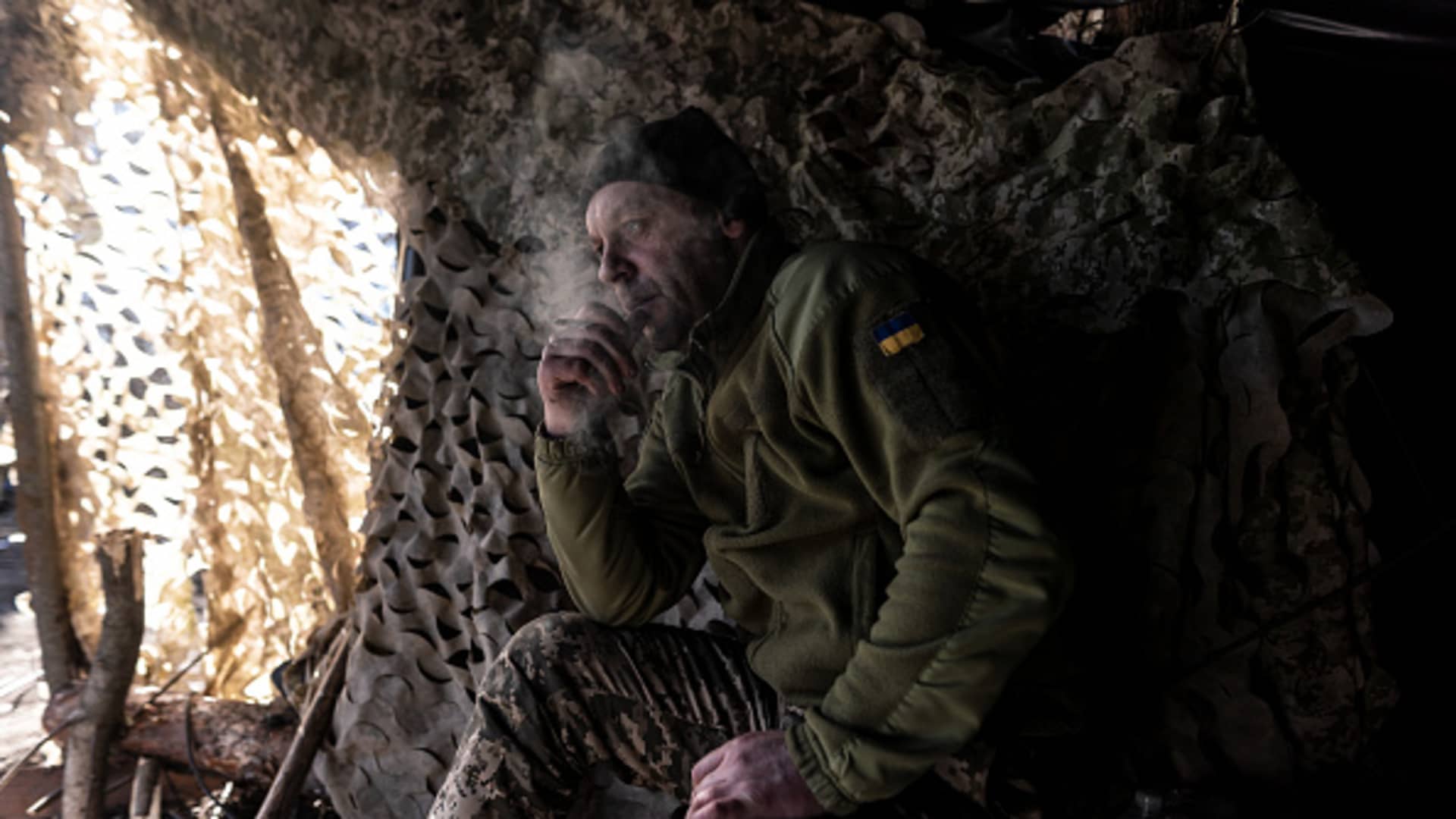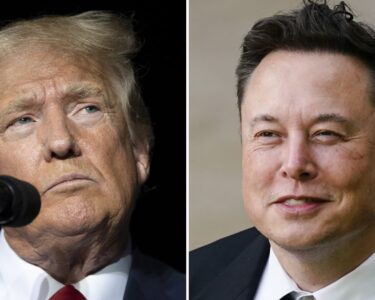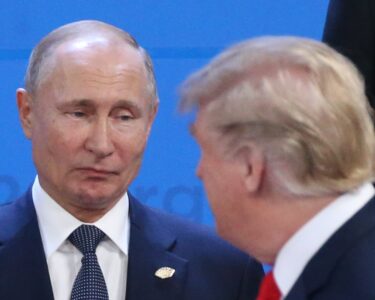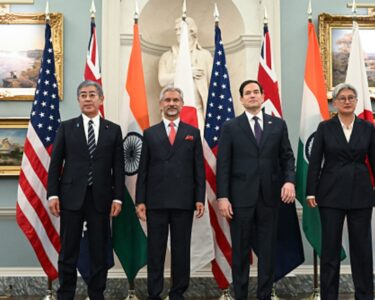This was CNBC’s live blog tracking developments on the war in Ukraine.
Ukraine’s foreign ministry on Thursday said that Russian attempts to hold elections in occupied territories or to force regional residents to head to the polls would be “illegal” — a sentiment echoed by NATO chief Jens Stoltenberg in a separate briefing, Reuters reports.
Russia’s presidential election is slated to take place over March 15-17.
Meanwhile, two people were killed and several were injured in Ukrainian attacks on the Russian region of Belgorod, its governor said. CNBC could not independently verify the details.
Earlier, the White House said it had no reason to adjust the U.S.’ “nuclear posture” after comments by Russian President Vladimir Putin Wednesday in which he said his country was “technically” ready for nuclear war.
In other news, Russian-installed officials at the Zaporizhzhia nuclear power plant in southern Ukraine accused Ukraine’s armed forces of shelling critical infrastructure at the plant on Thursday.
Russia has occupied the plant since March 2022, with the nuclear facility being a focal point of tensions and skirmishes between Ukrainian and Russian forces. CNBC was unable to verify the latest claims.
Hungary’s allies are cautioning the country about its relationship with Russia, David Pressman, the U.S. ambassador to Hungary said Thursday.
“Hungary’s allies are warning Hungary of the dangers of its close and expanding relationship with Russia,” he said in a speech marking the 25th anniversary of Hungary’s accession to NATO.
As Hungary’s foreign minister and prime minister are continuing to engage with Russia, it appears fostering a close relationship with the country is part of Hungary’s policy, Pressman said. If this is true, the allies would need to decide how to protect their security interests, he noted.
Pressman also criticized Hungary’s position on the war in Ukraine.
“Hungary could stand with Ukraine, alongside all of its NATO Allies, to demand real peace, true peace, which can only be based in freedom rather than standing beside Russia and calling for surrender and subjugation,” he said.
— Sophie Kiderlin
Russia is thought to have interfered with the satellite signal of an airplane carrying U.K. Defense Minister Grant Shapps on Thursday, Reuters reported citing multiple sources.
The aircraft reportedly could not access GPS and had to use alternative methods to assess its location, and mobile phones were unable to connect to the internet when the plane was flying near Russian city Kaliningrad on the Baltic Sea. The outage lasted for about thirty minutes, sources said.
Shapps was traveling back to the U.K. from Poland at the time.
— Sophie Kiderlin
Norway will hit NATO’s goal of spending 2% of a country’s gross domestic product on defense this year, its Prime Minister Jonas Gahr Stoere said in a statement on Thursday.
“The security policy situation is serious. We have to live with a more dangerous and unpredictable Russia, probably for a long time,” he said according to a Google translation.
Countries around Norway have been amping up their defense spending, and it is following suit, Stoere said. The country previously said its target was to reach the NATO defense spending goal by 2026.
“We must take responsibility for our own security, and we must help take responsibility for European security,” Stoere said.
— Sophie Kiderlin
NATO Secretary-General Jens Stoltenberg once more urged allies to show “political will” and provide military support to Ukraine.
“We have the capacity to give Ukraine what it needs. Now we need to show the political will to do so,” he said Thursday during a press briefing after the launch of the NATO Annual Report for 2023. “The Ukrainians are not running out of courage. They are running out of ammunition.”
Stoltenberg further called on allied countries to “step up,” echoing previous messaging that NATO members should meet their commitments to route 2% of their gross domestic products toward defense. A statement introducing the coalition’s latest annual report said two-thirds of NATO allies are expected to meet or exceed this defense spending target in 2024.
Individual country contributions were thrown into the spotlight in February when former U.S. president and presidential Republican nominee Donald Trump said he would not protect NATO nations from Russian hostilities if they lag on their membership contributions.
“We have the capacity, we have the economies to be able to provide Ukraine what they need,” Stoltenberg said Thursday. “This is a question of political will. To take those decisions and to prioritize support for Ukraine. And therefore we need the decision to invest more in the defense industry.”
— Ruxandra Iordache
Two people were killed and several others were injured following Ukrainian strikes in the western Russian region of Belgorod on Thursday, local Governor Vyacheslav Gladkov said.
In several Telegram posts, Gladkov said that multiple towns in the region were hit by Ukraine, and that cars and houses were damaged or destroyed.
Russian air defense systems shot down as many as ten Ukrainian missiles, he noted.
CNBC could not confirm developments on the ground.
— Sophie Kiderlin
Russia’s foreign ministry on Thursday announced that it was banning a further 227 U.S. citizens from entering the country in a Google-translated statement.
The figure included people “involved in the development, implementation and justification of the Russophobic course of the current US Administration” and “those directly involved in anti-Russian actions,” the Russian foreign ministry said.
The list features a large number of academics, business representatives, especially from technology and military equipment companies, as well as political figures such as senior advisors, deputy ministers, government spokespeople and a former U.S. ambassador to Russia.
— Sophie Kiderlin
Ukraine’s foreign ministry on Thursday said it would be illegal for Russia to hold elections in occupied territories of Ukraine, and that the votes would not have any legal consequences.
“Forcing millions of Ukrainian citizens who live in temporarily occupied territories or who have been forcibly transferred to Russian Federation territory to participate in the so-called “elections” is equally illegal,” a ministry statement said.
Russia’s attempt to hold elections in occupied regions showed the country’s “flagrant disregard” for international laws and conventions, the foreign ministry added.
“We urge Ukrainian citizens who live in the temporarily occupied territories of Ukraine or are forced to stay in the territory of the Russian Federation not to participate in the ‘pseudo-elections’ of the Russian President,” it said.
Separately, NATO Secretary-General Jens Stoltenberg told reporters that any efforts to organize elections in Ukraine’s occupied regions would be illegal, Reuters reported.
— Sophie Kiderlin
Deputy chairman of the Russian Security Council, Dmitry Medvedev, on Thursday shared a proposed peace plan from a Russian perspective, which among other points calls for Ukraine to surrender.
The plan is a response to the 10-point peace formula proposed by Ukrainian President Volodymyr Zelenskyy, which is being discussed by allies as a potential basis for peace negotiations.
“Everyone understands perfectly well, including the out-of-touch Western liars, that even in much simpler situations during war, peace can be achieved either with the mutual will of the parties on the basis of a reasonable compromise, or through the surrender of one of the parties to the conflict,” Medvedev wrote in a Telegram post, according to a Google translation.
Ukraine was not willing to negotiate, he added, before suggesting an alternative six-point plan. Ukraine should recognize its defeat and commit to “complete and unconditional surrender,” as well as de-militarize.
Medvedev also called for the dissolution of Ukrainian authorities and the election of a provisional parliament, which should recognize “that its entire territory is the territory of the Russian Federation,” and pass a reunification act, before dissolving again.
The United Nations and international community should condemn the current Ukrainian government and ultimately recognize the reunification, he added.
— Sophie Kiderlin
The Kremlin defended comments made by Russian President Vladimir Putin on Wednesday in which he said Russia was “technically” ready for a nuclear war, and was ready to conduct nuclear tests if the U.S. did so, saying the remarks did not constitute a threat to use them.
The remarks, published in pro-Kremlin media Wednesday, echoed previous comments Putin has made about Russia’s nuclear arsenal, saying Russia would only consider using them if the country’s existence was under threat. The White House responded that it saw no reason to adjust its own “nuclear posture” after the comments.
Kremlin Press Secretary Dmitry Peskov said Thursday that Putin was just answering questions from Russian journalist Dmitry Kiselev, and that the comments had been distorted by the Western media.
“Putin did not make any threats about the use of nuclear weapons in this interview. He answered, firstly, the journalist’s questions, and these were precisely the journalist’s questions, and not some special statements,” Peskov said, according to comments published by news agency RIA Novosti and translated by Google.
“And the president was just talking about the reasons that could make the use of nuclear weapons inevitable. These are the reasons that are indicated in our relevant documents, which are well known throughout the world,” he added.
“This is a deliberate distortion of the context and a reluctance to listen to President Putin. Again, there is nothing new in this. This is what we are very focused on [and have] observed for a long time and especially in the last two years,” Peskov said. Moscow has repeatedly criticized what it sees as a “Russophobic'” Western media since it invaded Ukraine two years ago.
— Holly Ellyatt
Russia has launched “massive” drone and artillery strikes against Ukraine overnight, Ukrainian officials said, with civilian infrastructure targeted in the northeast, east and south of the country.
The strikes come after a sharp uptick in Ukrainian drone and missile attacks against Russian regions over the last few days, with a number of major Russian oil refineries targeted and disrupting production.
Oleh Synehubov, the governor of the eastern border region of Kharkiv, said on Telegram on Thursday morning that Russia had carried out “massive” attack using drones, or UAVs (unmanned aerial vehicles), on television infrastructure in the region, with restoration work ongoing.
“About 15 settlements of the Kharkiv region were hit by enemy artillery and mortar attacks,” Synehubov said. There appeared to be no casualties from the attacks, he said, according to a Google translation.
In the neighboring Sumy region, the military administration said civilian infrastructure had been targeted in the cities of Sumy, Shostka, Trostyanets, and Bilopillya. Missile strikes were also carried out on Shostka and Trostyanets.
All in all, around 150 settlements in the Chernihiv, Sumy, Kharkiv, Luhansk, Donetsk, Zaporizhia, Dnipropetrovsk, Kherson and Mykolaiv regions had come under Russian artillery fire, Ukraine’s military said in its latest update on Thursday morning.
— Holly Ellyatt
The White House said it had no reason to adjust the U.S.’ “nuclear posture” after comments by Russian President Vladimir Putin Wednesday in which he said Russia was “technically” ready for nuclear war.
Asked to respond to the remarks, White House spokeswoman Karin Jean-Pierre said Wednesday that the Biden administration saw no need to adjust its assessment of the nuclear threat posed by Moscow.
“We have not seen any reasons to adjust our own nuclear posture … nor any indication that Russia is preparing to use a nuclear weapon in Ukraine,” she told reporters.
In an interview published by pro-Kremlin media Wednesday, Putin said, “from a military-technical point of view, we are, of course, ready … [and] constantly in a state of combat readiness,” for nuclear war.
He added, however, that cool heads were likely to prevail to prevent a “rushing” toward such a scenario. Nonetheless, Putin said Russia would be ready to conduct nuclear tests if the U.S. did so.
— Holly Ellyatt
Russian-installed officials at the Zaporizhzhia nuclear power plant (ZNPP) accused Ukraine’s armed forces of shelling critical infrastructure at the plant on Thursday.
On Thursday, officials at the site in southern Ukraine said the plant had been shelled and that an explosive device was dropped into an area where tanks with diesel fuel were located, adding that the action could have had “dire consequences.”
“Such attacks are unacceptable … But despite everything, we are recording ongoing shelling,” the Russian-run ZNPP Telegram channel stated, in comments translated by Google.
Russia has occupied the ZNPP since March 2022, early on in the invasion of Ukraine. The nuclear facility has been a focal point of tensions and skirmishes between Ukrainian and Russian forces ever since, with both accusing each other of endangering the safety of the plant and risking a nuclear disaster.
The International Atomic Energy Agency (IAEA), which has been monitoring the site during the war, was notified of the incident, the Telegram post added.
CNBC was unable to immediately verify the claims made in the post and Ukraine has not commented on the claims.
— Holly Ellyatt
Russian Foreign Ministry spokeswoman Maria Zakharova said on Wednesday that the United States planned to stage cyberattacks on Russia’s electronic voting system during its presidential election from March 15-17.
Zakharova also said Washington had tasked U.S. non-governmental organisations with undermining the election by decreasing voter turnout. Her comments echoed similar accusations by Russia’s foreign intelligence service made this week.
— Reuters
European Union ambassadors agreed in principle on Wednesday to reform the European Peace Facility fund in order to supply aid worth 5 billion euros ($5.48 billion) to Ukraine this year, the Belgian presidency of the EU said in a post on social media platform X.
“The [EU] remains determined to provide lasting support to [Ukraine] & ensure that the country gets the military equipment it needs to defend itself,” the post said.
The European Peace Facility is a mechanism set up in 2021 aiming to support the EU’s ability to create peace, security and prevent conflict, which member states pay into every year based on the agreed budget.
— Sophie Kiderlin
Russia does not intend to join a high-level peace conference that aims to bring an end to the war in Ukraine, even if it is formally invited, a spokesperson for the Russia Foreign Ministry said in a statement.
Switzerland said earlier this year that it would aim to host a peace conference in the coming months.
Russian Foreign Ministry spokesperson Maria Zakharova cited a number of reasons for Russia not participating in the event, including that the conference will discuss Ukrainian President Volodymyr Zelenskyy’s 10-point peace formula.
Ultimatums to Russia are a key part of the plan and are unacceptable, she added.
“Secondly, Switzerland can hardly serve as a platform for various peacekeeping efforts, since this assumes a neutral status, which Bern has lost,” the statement said, according to a Google translation.
Zakharova said previous attempts by the West to broker peace, such as the so-called Minsk agreements, had shown its inability to negotiate.
Russia would in principle be open to negotiations, Zakharova said, but only if Russian interests are taken into account and military aid to Ukraine was halted, among other conditions.
— Sophie Kiderlin
Ukraine’s Security Service on Wednesday claimed responsibility for drone attacks on three oil refineries in Russia.
Oil refineries in Ryazan, Kstovo in the Nizhny Novgorod region and Kirishy, in the Leningrad region, were all deliberately targeted, according to a Ukrainian security source who asked for anonymity because they are not authorized to speak publicly about operations.
The source confirmed to NBC that the latest attacks are a continuation of a series of special operations against Russian oil refineries which were previously launched by the security service.
“We are systematically implementing a detailed strategy to reduce the economic potential of the Russian Federation. Our task is to deprive the enemy of resources and reduce the flow of oil money and fuel, which the Russian Federation directs directly to the war, to the murders of our citizens,” the source added.
The security source said footage on social media proved that the consequences of the attacks were significant amid reports of fires at the facilities. The refineries attacked today are among the top five largest plants in the Russian Federation, the source noted.
In addition, the SBU, together with other representatives of the defense forces, attacked the air base of the Russian Air Force in Buturlinivka and the military airfield in Voronezh with drones.
— Holly Ellyatt
Russia’s defense ministry claimed on Wednesday that Russian air defense systems had destroyed numerous drones and missiles fired at its territory by Ukraine over the past 24 hours.
“During the [past] day, air defense systems shot down 136 Ukrainian unmanned aerial vehicles, four HIMARS MLRS missiles made in the United States, six Grad MLRS missiles, as well as three Hammer guided aerial bombs made in France,” the ministry said on Telegram.
CNBC was unable to verify the information in the post and Ukraine has not commented on the apparent increase in attacks. Russian media agencies have published multiple reports over the last few days of attempted drone and missile attacks against Russian regions, particularly those along the border with Ukraine, as well as damage to energy infrastructure, with oil refineries being targeted.
— Holly Ellyatt
Several major oil refineries in Russia appear to be out of action following Ukrainian drone attacks.
Two primary oil refining units were shut down in Rosneft’s Ryazan oil refinery on Wednesday after a fire caused by a drone attack, two sources familiar with the situation told Reuters. Rosneft has not commented on the incident.
Meanwhile, operations at the Novoshakhtinsky oil products plant in the Rostov region were stopped after drones shot down by Russian air defenses fell on the facility, regional Governor Vasily Golubev said on Telegram. No one was injured in the incident.
Production was also halted at Lukoil’s NORSI refinery in the Nizhny Novgorod region on Tuesday after a drone attack caused a fire.
Ukraine’s security service on Wednesday claimed responsibility for the drone attacks on oil refineries in Ryazan, Kstovo in the Nizhny Novgorod region and Kirishy, in the Leningrad region, saying the latest attacks were a continuation of a series of special operations against Russian oil facilities.
“We are systematically implementing a detailed strategy to reduce the economic potential of the Russian Federation,” a Ukrainian security source, who asked for anonymity because they are not authorized to speak publicly about operations, told NBC News.
“Our task is to deprive the enemy of resources and reduce the flow of oil money and fuel, which the Russian Federation directs directly to the war, to the murders of our citizens,” the source added.
Oil prices were around 2% higher Wednesday against the backdrop of refinery attacks and potential disruption to oil supplies from major producer, Russia.
— Holly Ellyatt
Oil prices rise after drone attacks on Russian refineries; Russia ready for nuclear war, Putin says






